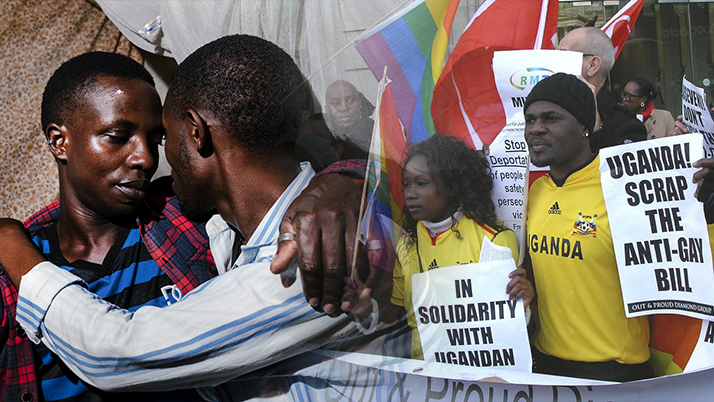President Museveni Assents to Anti-Homosexuality Act Amid Controversy
 |
| Examining the Implications for LGBT Rights in Uganda |
Uganda's President Yoweri Museveni has officially signed the Anti-Homosexuality Bill 2023 into law, thereby transforming it into the Anti-Homosexuality Act 2023. The legislation, which introduces stricter penalties for same-sex relationships in a country where homosexuality is already illegal, has sparked heated debates and drawn international attention.
President Museveni has long criticized Western nations for imposing their views on African countries, asserting that such actions are hypocritical given the existence of "weird cultures" in the West. This article explores the implications of the new law and the broader context of LGBT rights in Africa.
The recently signed Anti-Homosexuality Act 2023 in Uganda imposes severe penalties for same-sex relations, including death for aggravated homosexuality and life imprisonment for engaging in homosexual activities. Aggravated homosexuality encompasses instances involving minors or when the perpetrator is HIV positive, among other criteria. It is important to note that Uganda is not the only African country to have banned same-sex relations, as over 30 nations on the continent have enacted similar legislation.
President Museveni's Stance on Western Influence:
President Museveni has consistently voiced his opposition to what he perceives as Western countries imposing their views on African nations, particularly regarding LGBT rights. He argues that threats of sanctions by Western nations on countries that resist embracing homosexuality are hypocritical, emphasizing that each culture should be allowed to determine its own practices without interference. Museveni's stance reflects a broader sentiment among some African leaders who assert the need to preserve traditional values and societal norms.
Human Rights Concerns:
Critics of the Anti-Homosexuality Act have expressed deep concerns over its implications for human rights and the well-being of LGBT individuals in Uganda. Human Rights Watch has highlighted that this law appears to be the first in Africa to criminalize the mere identification as LGBT, further endangering an already marginalized community. Such legislation contributes to the stigmatization and discrimination faced by LGBT individuals, impeding their ability to access healthcare, education, and employment opportunities.
International Response and Sanctions:
The enactment of the Anti-Homosexuality Act has drawn significant international attention and condemnation. Western countries and human rights organizations have expressed deep concern about the violation of LGBT rights and the potential negative impact on Uganda's reputation and relationships with foreign partners. Calls for sanctions against Uganda have emerged as a means to pressure the government to reconsider this legislation. However, discussions around the effectiveness and implications of such measures continue.
The enactment of the Anti-Homosexuality Act highlights the ongoing tension between traditional cultural values, human rights, and international influence. While Uganda and other African nations hold firm on their stance against homosexuality, advocates for LGBT rights stress the importance of promoting inclusivity, respect, and equality for all individuals. Meaningful dialogue and engagement are necessary to bridge the gap between diverse cultural perspectives and universal human rights principles.
Advertisement
Transwomen in Uganda are rejected by 99% of Ugandan Men.
 |
| Kimlove Ug |
 |
| Byesigye’s Trangender Son |
For those who don't know a transwoman is a person who was registered as male at birth but now lives and identifies as a woman. Uganda's hostility towards homosexuality is well known, Gay and lesbian sex is punishable by life imprisonment, and LGBTI people often face discrimination, threats and harassment.Many Transwomen or LGBTI people are already so vulnerable in the countrye facing rampant homophobia home should be the safest place but most transwoman we've talked to say that they face a lot provocations from Boda Boda men and men in Bars mocking them. All the groups of men we talked to said that they can't even be near a transgender and they feel uncomfortable even being near them.Most believe that these transgenders are abominations to their families and they pitty their families for giving birth to these often called ‘faggots’.
Conclusion:
Uganda's President Museveni has assented to the Anti-Homosexuality Act 2023 amid international controversy. The law introduces harsh penalties for same-sex relations, drawing attention to the ongoing debate surrounding LGBT rights in Africa. President Museveni's criticism of Western influence resonates with broader sentiments about cultural autonomy. However, concerns about human rights violations persist, urging the need for continued advocacy and dialogue to foster understanding and inclusivity. As discussions unfold, it is crucial to strive for a balance that respects cultural diversity while upholding fundamental principles of equality, dignity, and non-discrimination for all individuals.
We would really want to know your opinion on Gays and Transgenders in Uganda..Please leave us your opinion in the comment section below.







